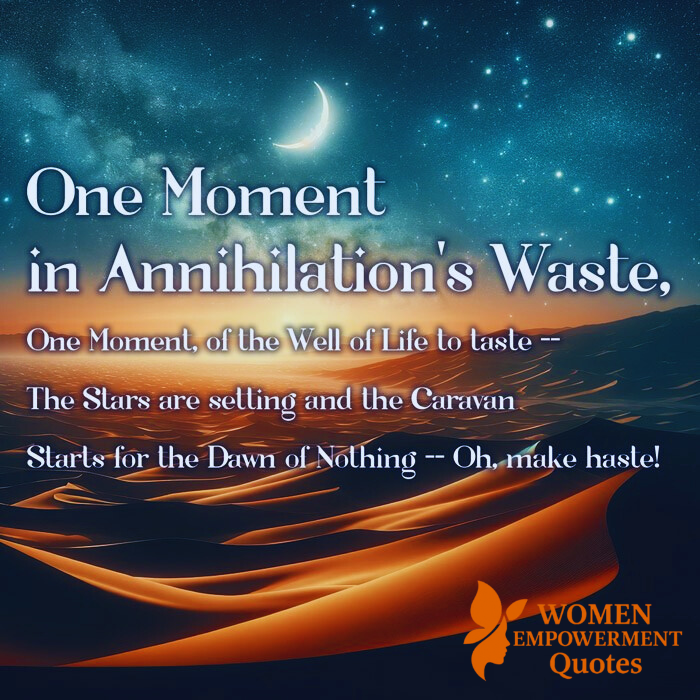
In the short span of our lives, we are met with a truth both sobering and sacred: every moment is a fleeting gift, a single breath suspended between what was and what may never be again. The poetic line, “One Moment in Annihilation’s Waste, One Moment, of the Well of Life to taste,” stirs the soul, urging us to drink deeply from life’s well before the silence of eternity swallows us whole.
The image of “The Stars are setting” paints a celestial picture of impermanence, reminding us that even the brightest lights in the sky eventually fade. It is a cosmic mirror of our own mortality, teaching us that no brilliance, no glory, no love, no sorrow—nothing lasts forever. Our lives, like the stars, are passing glimmers in a vast, unfolding story.
And still, “the Caravan Starts for the Dawn of Nothing.” This mysterious metaphor whispers of the journey we all must make—into the unknown, the unseen. It calls us to face the quiet certainty of our end, not with dread, but with courage and clarity. For in facing death, we begin to truly live.
“Oh, make haste!”—these words echo like a heartbeat against time. They are not just a cry, but a command: Live now. Love now. Speak, forgive, create, and dream now. Because now is all we are ever promised.
This meditation on impermanence gently compels us to lay down the burdens of what doesn’t matter. The noise, the striving, the shallow distractions—they fall away in the face of such truth. What remains is the call to live intentionally, to love boldly, and to give our hearts fully to what will outlast us: kindness, legacy, and connection.
The Gift of Impermanence
Throughout the wisdom traditions of the world, impermanence is not an enemy—it is a teacher. Buddhism calls it anicca, a cornerstone of liberation. Heraclitus declared, “All is in flux.” The message is clear: the only constant is change.
And in this truth, we find a rare kind of freedom. When we stop clinging to what cannot stay, we begin to hold dear what does: growth, compassion, purpose. We begin to turn inward, seeking transformation, and outward, seeking to bless others.
Rumi, in his eternal wisdom, wrote:
“Be a lamp, or a lifeboat, or a ladder. Help someone’s soul heal.”
These words call us beyond ourselves. They call us to live lives that lift others, to become a source of light in a world of fleeting shadows.
When we welcome impermanence instead of resisting it, we begin to walk through life with open hands. Joy, pain, success, loss—they pass through us, and we through them. But peace comes in knowing that we were present. That we did not miss what was sacred in the ordinary.
In the end, recognizing life’s brevity is not a reason for sorrow. It’s a reason to rejoice. It’s the very reason we can live fully, love deeply, and leave behind something that echoes beyond our final breath.
Related Reflections:
-
“The fear of death is more to be dreaded than death itself.” – Publilius Syrus
-
“It is possible to live on bread, but not on bread alone in order to create.” – Nikos Kazantzakis
-
“We are all expendable for a certain cause.” – J. Robert Oppenheimer
-
“Even though I walk through the valley of the shadow of death, I will fear no evil.” – Psalm 23
-
“In the depth of winter, I finally learned that within me there lay an invincible summer.” – Albert Camus